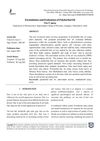2 citations,
June 2018 in “Cosmetics” AMPD is a better and less damaging alternative to ammonium hydroxide for hair bleaching.
 116 citations,
December 2017 in “International Journal of Women's Dermatology”
116 citations,
December 2017 in “International Journal of Women's Dermatology” Adult female acne treatment should be personalized, considering individual preferences and pregnancy, using various topical and oral medications while managing side effects and resistance.
 June 2016 in “CRC Press eBooks”
June 2016 in “CRC Press eBooks” Sleep problems and skin issues affect each other; poor sleep can worsen skin conditions, and some skin treatments can improve or harm sleep quality.
 3 citations,
January 2000
3 citations,
January 2000 Some alternative therapies for vitiligo show promise but need more research.
 1 citations,
September 2023 in “Dermatology and therapy”
1 citations,
September 2023 in “Dermatology and therapy” More research is needed to find the best treatment for dissecting cellulitis of the scalp.
 October 2023 in “Research Square (Research Square)”
October 2023 in “Research Square (Research Square)” Oxidative stress is linked to mild patchy alopecia areata.
 16 citations,
November 2020 in “International journal of pharmaceutics”
16 citations,
November 2020 in “International journal of pharmaceutics” Using longer PEG chains helps nanoparticles penetrate hair follicles better, improving drug delivery for conditions like alopecia.
 9 citations,
April 2021 in “Evidence-based complementary and alternative medicine”
9 citations,
April 2021 in “Evidence-based complementary and alternative medicine” Guilu Erxian Glue may help reduce chemotherapy side effects like weight loss and heart stress.

New treatments for vitiligo may focus on protecting melanocyte stem cells from stress and targeting specific pathways involved in the condition.
 45 citations,
January 2020 in “Pharmaceutical Biology”
45 citations,
January 2020 in “Pharmaceutical Biology” Dendrobium officinale polysaccharides may help with hair growth, skin moisturization, and protection against oxidative damage.
 1 citations,
August 2021 in “International journal of scientific research in science and technology”
1 citations,
August 2021 in “International journal of scientific research in science and technology” The polyherbal hair oil promotes hair growth, reduces hair loss, and is safe to use.
 11 citations,
January 2004 in “Exogenous dermatology”
11 citations,
January 2004 in “Exogenous dermatology” Outside factors like grooming, chemicals, and the environment can damage hair and cause disorders.
 26 citations,
February 2009 in “Drug Development Research”
26 citations,
February 2009 in “Drug Development Research” 17α-estradiol is a safe estrogen that might protect the brain and doesn't cause feminization, needing more research for treating brain diseases.
 14 citations,
April 2019 in “International Journal of Women's Health”
14 citations,
April 2019 in “International Journal of Women's Health” Some treatments can stabilize Frontal Fibrosing Alopecia, but more research is needed to find effective treatments, and hair transplants often fail.

New treatments for hair loss show promise, including plasma, stem cells, and hair-stimulating complexes, but more research is needed to fully understand them.
7 citations,
January 2020 in “Skin Appendage Disorders” Take care of your hair as much as your face for a youthful look.
 53 citations,
October 2014 in “Free radical biology & medicine”
53 citations,
October 2014 in “Free radical biology & medicine” Defective mitochondrial DNA replication causes aging symptoms and increased oxidative damage in mice.
3 citations,
February 2024 in “International journal of molecular sciences” Hesperidin from orange peels is a promising natural ingredient for skincare due to its multiple beneficial properties.
 March 2024 in “International journal of molecular sciences”
March 2024 in “International journal of molecular sciences” Zinc, copper, and iron are important for skin health and may help diagnose skin diseases.
 520 citations,
January 2017 in “AIMS biophysics”
520 citations,
January 2017 in “AIMS biophysics” Photobiomodulation therapy using red and near-infrared light can reduce inflammation and aid in healing various conditions.
 January 2023 in “Postępy Dermatologii i Alergologii”
January 2023 in “Postępy Dermatologii i Alergologii” Azelaic acid treats acne, rosacea, and hyperpigmentation with minimal side effects.
 September 2024 in “Journal of the American Academy of Dermatology”
September 2024 in “Journal of the American Academy of Dermatology” Oxytocin receptors are found in skin cells near touch and pain neurons.
 December 2024 in “Research Journal of Topical and Cosmetic Sciences”
December 2024 in “Research Journal of Topical and Cosmetic Sciences” Natural treatments for alopecia are gaining interest due to fewer side effects.
 2 citations,
January 2023 in “International journal of biological sciences”
2 citations,
January 2023 in “International journal of biological sciences” Gray hair can potentially be reversed, leading to new treatments.
44 citations,
September 2020 in “International Journal of Molecular Sciences” New treatments are needed for PCOS that target its genetic, hormonal, and metabolic causes.
 May 2021 in “Boletín latinoamericano y del Caribe de plantas medicinales y aromáticas”
May 2021 in “Boletín latinoamericano y del Caribe de plantas medicinales y aromáticas” Microsechium helleri extract has antioxidant, anti-inflammatory, antidiabetic, and heart-protective benefits.

Intermittent fasting slows hair growth by damaging hair follicle cells.
 January 2024 in “Journal of Ayurveda Campus”
January 2024 in “Journal of Ayurveda Campus” Psoralea corylifolia Linn. is a medicinal plant used for skin diseases and has various health benefits.
 3 citations,
April 2022 in “Farmacia”
3 citations,
April 2022 in “Farmacia” Certain foods and supplements can help treat skin diseases alongside medication.
 15 citations,
October 2017 in “Dermatologic Clinics”
15 citations,
October 2017 in “Dermatologic Clinics” New treatments for male hair loss show promise but need more research for safety and effectiveness.

























